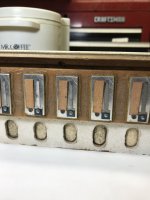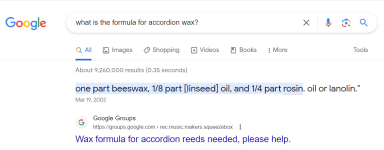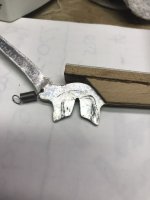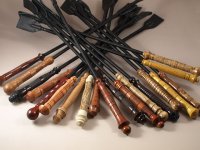32251
Active member
Vintage….a good word for “old”….Patti Brothers unit. The reeds look to be installed by “flooding” wax all around them. I pinged the reeds and most were very dull sounding. All I had to do was press down on the aluminum body and the Reed sounded just fine. Even though it’s encased with hardened wax and you can’t feel or see it move, the Reed will not vibrate correctly if the Reed frame is even vibrating the smallest amount. This is an accordion that is not worth much, but for sure can be made playable. So I read all the info I could find on remelting wax around reeds and the prevailing opinions said don’t…..so that just made me want to do it. Lol.
I took a 30 watt soldering pencil and removed the tip and sharpened it to a good point. Then after it came up to heat, I just tested it on the worst sounding Reed by running the point right next to the edge of the Reed frame all around it. The Reed came back to life and sounded fine. Then I ran a light layer of new wax in the trench the sharp hot point made around the Reed frame. A job that would have taken hours to remove all the reeds and rewax took minutes.
I think this is a viable repair for basket case accordions that are really not worth investing hundreds of dollars in. I would never recommend this for a fine expensive unit, but for a $50 lonely abandoned box….yes.
I took a 30 watt soldering pencil and removed the tip and sharpened it to a good point. Then after it came up to heat, I just tested it on the worst sounding Reed by running the point right next to the edge of the Reed frame all around it. The Reed came back to life and sounded fine. Then I ran a light layer of new wax in the trench the sharp hot point made around the Reed frame. A job that would have taken hours to remove all the reeds and rewax took minutes.
I think this is a viable repair for basket case accordions that are really not worth investing hundreds of dollars in. I would never recommend this for a fine expensive unit, but for a $50 lonely abandoned box….yes.






